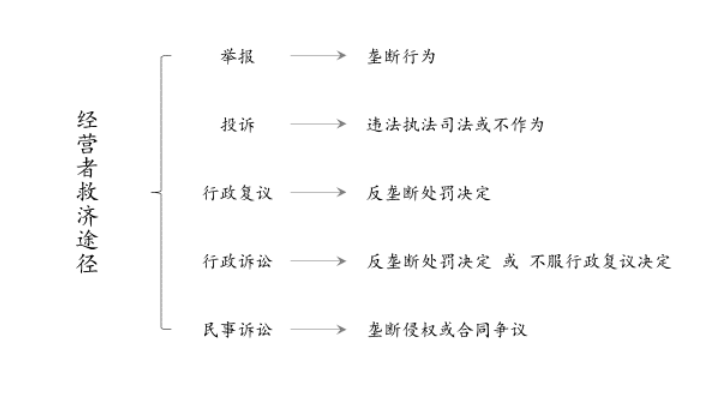
1. Law enforcement agency
• In August 2008, when the “Anti -Monopoly Law” was implemented, the antitrust law enforcement was responsible for the division of labor by the National Development and Reform Commission, the Ministry of Commerce, and the former State Administration of Industry and Commerce.
• In February 2018, in accordance with the “Deepening the Reform Plan for the Party and the State Institution” and the decision on the reform plan of the State Council’s institutional institution, the State Council established the General Administration of Market Supervision to be responsible for the unified law enforcement of antitrustness. The issue is to authorize the market supervision and management departments of the people’s governments of all provinces, autonomous regions, and municipalities directly under the Central Government to be responsible for antitrust law enforcement work within their own administrative regions, and establish a central and provincial level responsible for the anti -monopoly law enforcement system.
• As the country enters a new stage of development, higher requirements have been put on the construction of a national unified market and fair competition in protection. Anti -monopoly law enforcement and anti -monopoly law enforcement divisions are responsible for antitrust -related work. At the same time, the establishment of competitive policies and big data centers to strengthen anti -monopoly, theoretical theoretical research and technical support. The adjustment of the agency further enriched the anti -monopoly supervision force and provided a strong guarantee for the work of antitrust.

2. Law Enforcement basis
• Anti -monopoly involves a wide range of policies, professionalism, and technical characteristics of regulatory law enforcement. In addition to the “Anti -Monopoly Law” as the Basic Law, 8 guide guidelines such as the “Anti -Monopoly Guide to the Platform Economic Field”, explain the idea of antitrust law enforcement, and enhance the operability and expected of the antitrust legal system. The main body establishes an open and transparent institutional rules; 5 rules and regulations such as the “Interim Regulations on the Objective to Out of Marketing Domination Status” are designed to unify the anti -monopoly law enforcement procedures, standards and standards; The work system of the State Council’s Anti -Monopoly Committee; and involving case investigations, centralized review of operators, and punishment of monopoly cases, covering 27 working systems for the entire process of business and the entire process of investigation review, and the printing and issuance of antitrust law enforcement document format formats , Make the antitrust work standards unified, there are chapters to follow.
• In addition, the amendments to the revision of the “Anti -Monopoly Law” with the goal of enhancing the scientific, forward -looking and effectiveness of the antitrust legal system are also close to the end. It is expected that the legislative review will be officially promulgated during the year.
• So far, my country has basically established a legal system that covers online and offline and is becoming increasingly systematic. These laws and regulations not only provide law enforcement basis for law enforcement, and important references for operators’ compliance, it is worth paying close attention to the operators.

Three, the relief pathway of the operator
• At present, my country’s antitrust law enforcement mainly focuses on the key areas of people’s livelihood development around the platform economy, medicine, public utilities, building materials, automotive, education, and finance. Reporting is the main way to find problems at present.
• In addition to the conventional complaints of the antitrust law enforcement process, after being punished by antitrust law enforcement administrative penalties, operators can safeguard their legitimate rights and interests through two relief channels of administrative reconsideration and administrative lawsuits. According to Article 53 of the Anti -Monopoly Law, the decision of the operator’s decision to prohibit operators’ concentration or decision on the prohibition of operators made by the operator of the antitrust law enforcement agencies may apply for administrative reconsideration first to apply for administrative reconsideration to administrative administration to administrative administration If the reconsideration is not convinced, you can file an administrative lawsuit according to law, that is, these two types of cases, administrative reconsideration is the pre -procedure of administrative lawsuits; in addition, other decisions made by antitrust law enforcement agencies, operators can choose to apply for administrative reconsideration, or they can follow the law according to law, or according to law, or according to law Purly filed an administrative lawsuit.
• At present, my country’s antitrust law enforcement mainly focuses on the key areas of people’s livelihood development around the platform economy, medicine, public utilities, building materials, automotive, education, and finance. Reporting is the main way to find problems at present.
• In addition to the conventional complaints of the antitrust law enforcement process, after being punished by antitrust law enforcement administrative penalties, operators can safeguard their legitimate rights and interests through two relief channels of administrative reconsideration and administrative lawsuits. According to Article 53 of the Anti -Monopoly Law, the decision of the operator’s decision to prohibit operators’ concentration or decision on the prohibition of operators made by the operator of the antitrust law enforcement agencies may apply for administrative reconsideration first to apply for administrative reconsideration to administrative administration to administrative administration If the reconsideration is not convinced, you can file an administrative lawsuit according to law, that is, these two types of cases, administrative reconsideration is the pre -procedure of administrative lawsuits; in addition, other decisions made by antitrust law enforcement agencies, operators can choose to apply for administrative reconsideration, or they can follow the law according to law, or according to law, or according to law Purly filed an administrative lawsuit.


Lawyer Wang Fen
Graduated from the Department of Economic Law of Northwest Political Science and Law School, with more than ten years of legal service experience, customer satisfaction is extremely high;
It advocates that the law serves as the operation, can in -depth consulting units to the front line, and provide the consultant unit with valuable services that can be operable and pre -control risks;
It can independently develop topics to provide daily legal training in the enterprise, including labor law, contract law, shareholder disputes, intellectual property and competition law.
您的浏览器当前宽度低于1400px;请使用1400px以上宽度访问。